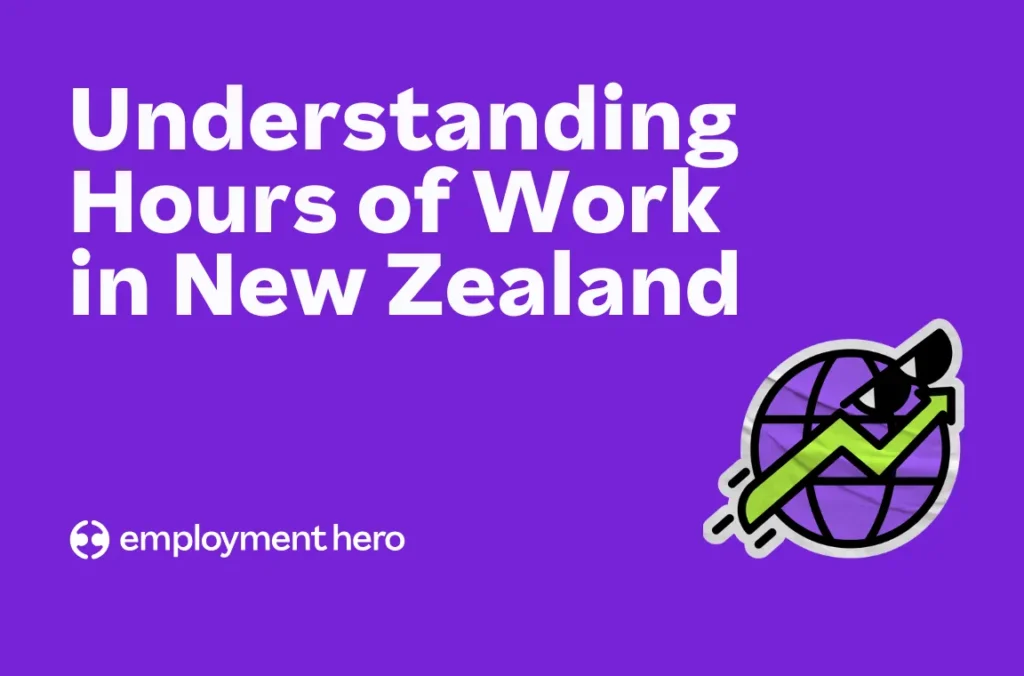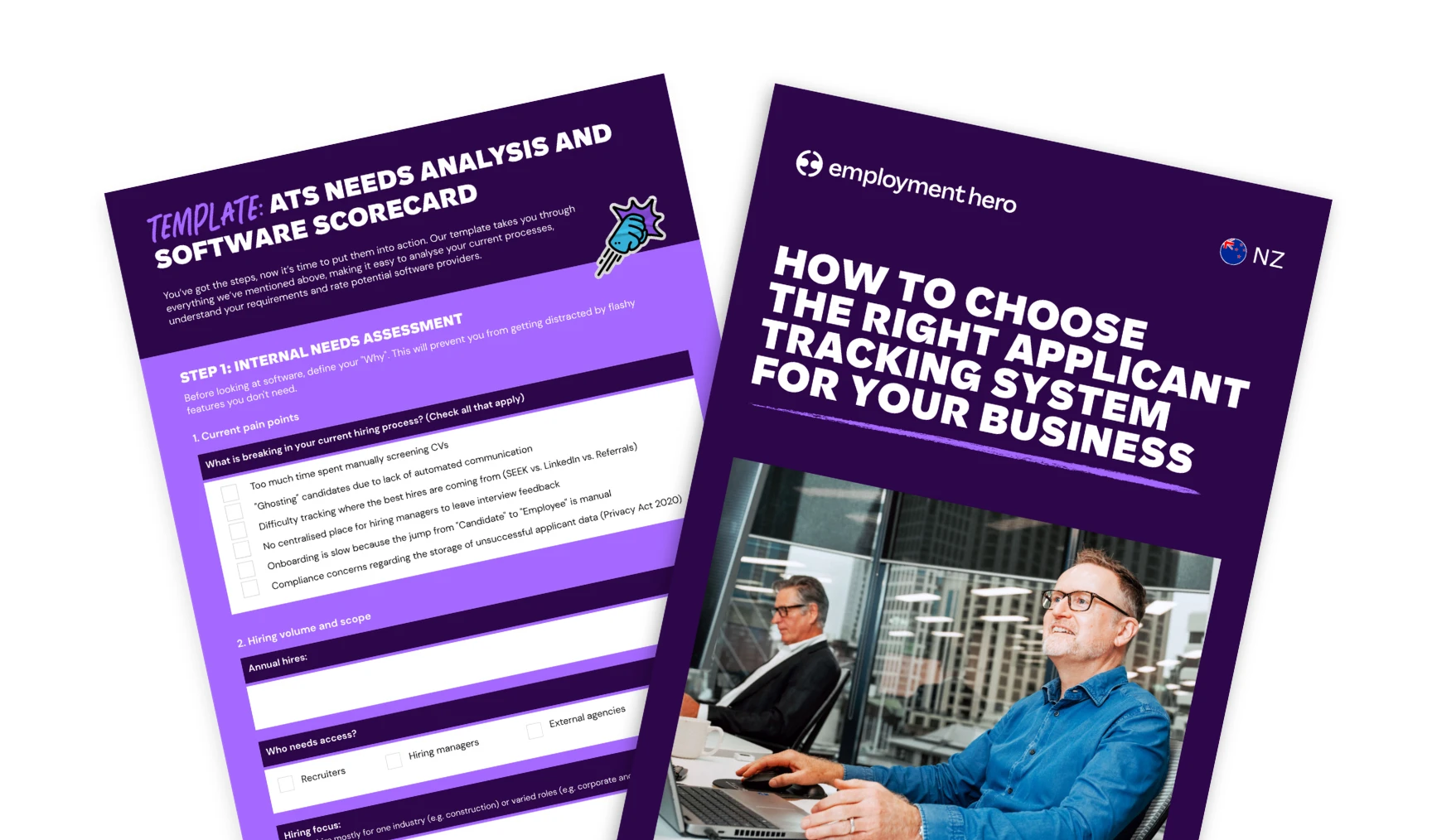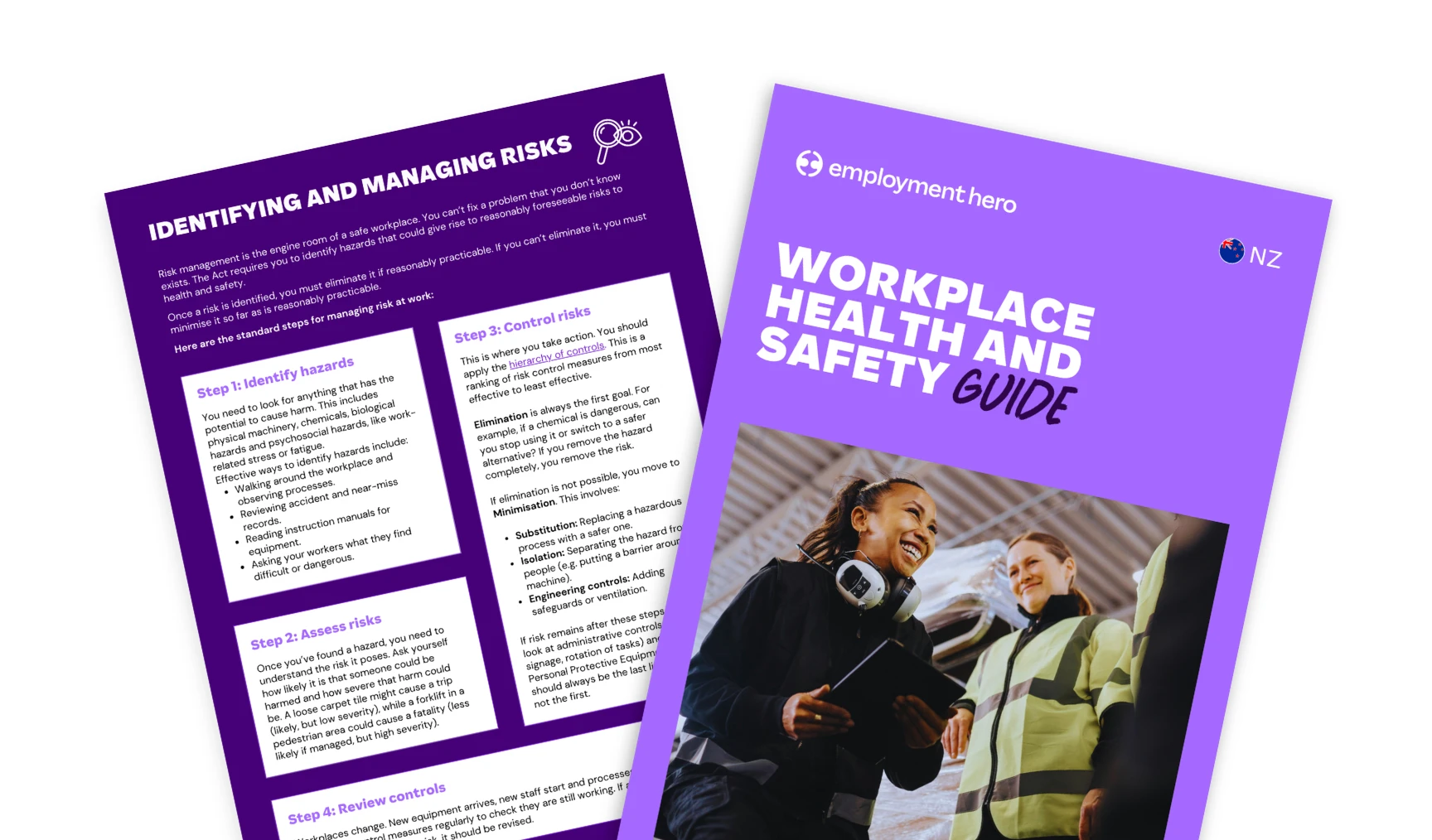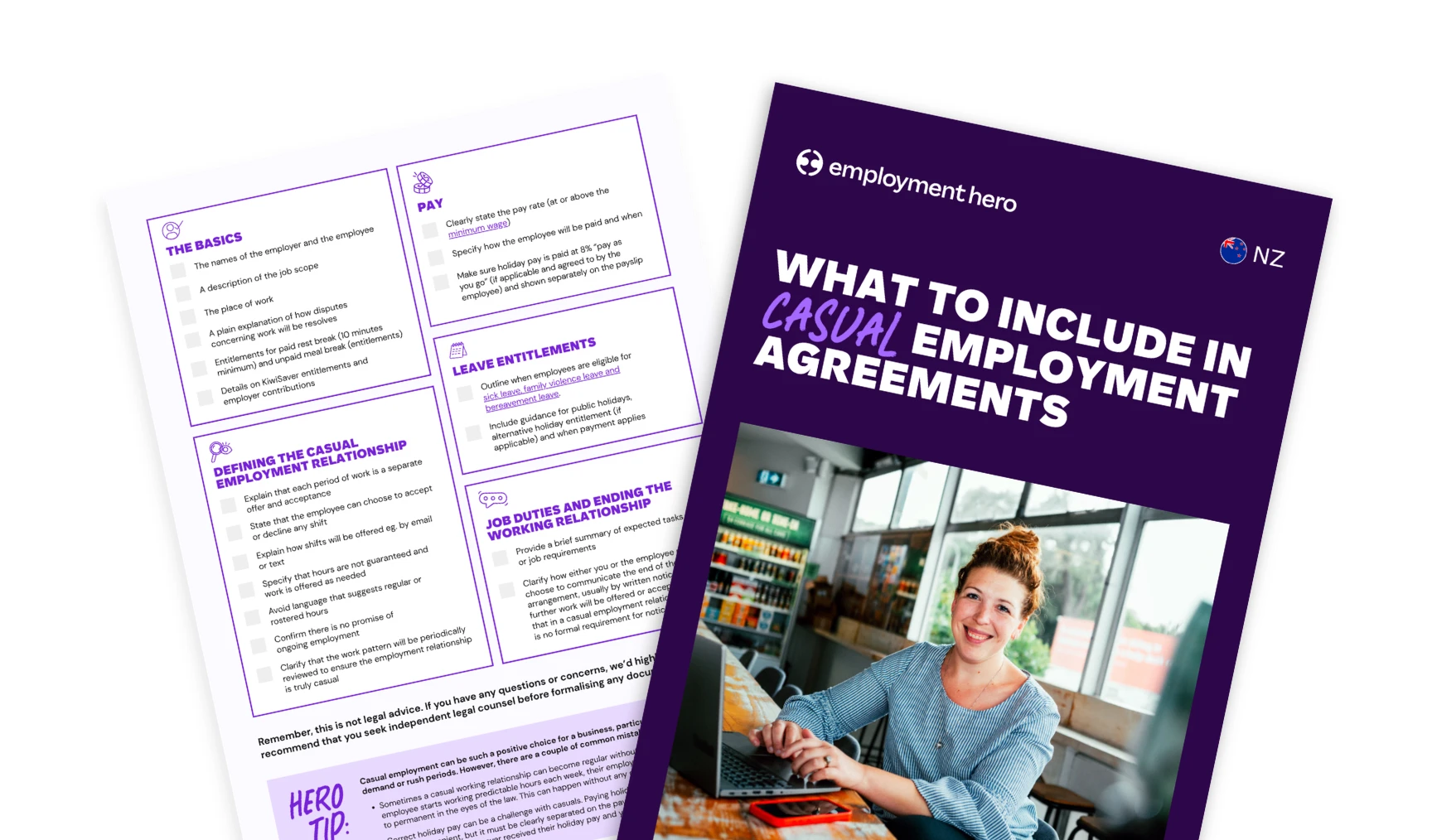Hours of work in New Zealand

Contents
Understanding the rules around hours of work in New Zealand is fundamental for any employer. It’s not just about compliance with the law. It’s about ensuring your team is productive, safe and fairly compensated for their time. Getting it right helps build a relationship of trust and prevents disputes that can be costly and damaging to your business.
This blog breaks down the key aspects of working hours, overtime, breaks and other regulations you need to know.
What are the standard working hours in New Zealand?
While there is no single definition of a ‘standard’ working week in New Zealand law, common practice for full-time work is a 40-hour week, typically spread over five 8-hour days.
Maximum working hours
The key legal requirement is found in the Employment Relations Act 2000. Under this Act, an employee’s employment agreement must state the maximum number of hours they can be required to work.
According to Employment New Zealand, those agreements must fix the maximum number of hours at no more than 40 per week, unless the employer and employee agree otherwise. These 40 hours don’t include overtime.
If the maximum number of hours (excluding overtime) are less than 40, then the employer and employee must try and fix the hours so they’re worked on no more than five days of the week.
It’s worth noting that as an employer, you have a duty of care under the Health and Safety at Work Act 2015. This means you must manage risks to health and safety, which includes preventing fatigue caused by excessive working hours. You cannot require an employee to work hours that are unreasonable or pose a risk to their health.
Statutory full-time working hours
The term ‘full-time’ is not formally defined in New Zealand legislation. What is considered full-time is usually determined by industry norms and the specifics of an employment agreement.
However, an employee working between 30 hours per week or more is usually considered full-time. Anything less is typically classified as part-time. The crucial element is that the agreed hours, whether full-time or part-time, must be clearly documented in the employment agreement.
Working hours regulations by industry
While the core principles apply to most workplaces, some industries have specific regulations or common practices due to the nature of their work.
- Transport: For drivers of commercial vehicles, managing fatigue is a critical safety issue. While specific logbook hours are regulated by Waka Kotahi (NZTA), employers must also follow health and safety guidelines to manage work schedules and prevent driver fatigue.
- Healthcare: Workers in this sector, such as doctors and nurses, often work long shifts and irregular hours. District Health Boards and other providers have specific collective agreements that detail rules around shift lengths, on-call work and rest periods to manage staff wellbeing.
- Hospitality: This industry frequently relies on shift work, including nights, weekends and public holidays. Employment agreements must clearly state how these variable hours will be managed, including rostering and pay rates for unsociable hours.
- Manufacturing: Production schedules may require shift work or extended hours during busy periods. Agreements in this sector often contain specific clauses for overtime rates and how shift patterns will operate.
Are any employees exempt from these rules?
The regulations around working hours, breaks and overtime primarily apply to employees covered by the Employment Relations Act 2000.
Independent contractors are not covered. They are self-employed individuals running their own business and their working arrangements are defined by a contract for services, not an employment agreement.
Some senior salaried employees may have terms in their agreements that state their salary covers all hours worked, which can affect how overtime is handled. However, this does not exempt the employer from health and safety duties regarding fatigue.
Casual employees are also covered by the Act, but their hours are irregular and offered on an as-needed basis. They are entitled to rest and meal breaks for the hours they do work.
Understanding overtime in New Zealand
Overtime is work performed beyond the employee’s normal, agreed-upon hours. For overtime to be binding, it must be addressed in the employment agreement. The agreement should specify whether overtime is voluntary or compulsory and how it will be compensated. Accurate recording of all hours worked is essential for both payment and health and safety monitoring.
What counts as overtime?
Overtime typically refers to any time worked beyond the daily or weekly hours specified in an employment agreement. This could include:
- Staying late to finish a task
- Working on a weekend when it is not part of the regular work pattern
- Working through a meal break at the employer’s request
Whether training or travel time counts as work time depends on the circumstances and what has been agreed.
Is there a maximum overtime limit?
There is no legal maximum for overtime hours. However, your responsibility to ensure a safe working environment remains. You must manage work to prevent employee fatigue. If an employee is consistently working long overtime hours, you should review their workload and wellbeing.
Overtime pay rates
New Zealand law does not mandate a specific pay rate for overtime. The rate of pay for overtime is a matter to be negotiated between the employer and employee and included in the employment agreement.
Common practice is to pay overtime at a higher rate, such as time-and-a-half (1.5 times the normal hourly rate) or double time (2 times the normal rate). For work on public holidays, specific rules apply for payment and providing an alternative holiday, which is separate from general overtime provisions.
Understanding rest periods and breaks
Employers are legally required to provide employees with paid rest breaks and unpaid meal breaks. The specific number and duration of breaks depend on the length of the work period.
The minimum entitlements are:
- 2 to 4 hours worked: One 10-minute paid rest break.
- 4 to 6 hours worked: One 10-minute paid rest break and one 30-minute unpaid meal break.
- 6 to 8 hours worked: Two 10-minute paid rest breaks and one 30-minute unpaid meal break.
The law sets out a default schedule for when these breaks should be taken but employers and employees can agree to different timings to suit the needs of the business.
Night shifts and weekend regulations
Working nights and weekends is common in many industries. There are no special pay rates prescribed in law for this type of work but employment agreements often include higher pay rates to compensate employees.
When rostering employees for shift work, particularly at night, you must consider the health and safety implications. Managing fatigue is crucial. For work on public holidays, employees are entitled to be paid at least time-and-a-half and may also receive an alternative holiday.
What are the risks of non-compliance with working hours?
Failing to comply with regulations around hours of work, breaks and pay can lead to serious consequences. The Labour Inspectorate can investigate and issue infringement notices or seek penalties against you in the Employment Relations Authority (ERA).
Penalties can be significant. More importantly, non-compliance can result in personal grievance claims from employees for issues like unpaid wages or breaches of the employment agreement. This can lead to financial awards for the employee and damage to your company’s reputation.
How does payroll software help with overtime payments?
Managing hours, breaks and overtime manually is time-consuming and prone to error. Employment Hero’s payroll software automates these processes, supporting compliance and improving accuracy.
Employment Hero can:
- Automatically calculate wages for overtime, shift work and public holidays based on pre-set rules.
- Provide an accurate audit trail of hours worked, breaks taken and payments made.
- Make it easier to monitor break entitlements by tracking work periods.
- Generate alerts if employees are approaching or exceeding their agreed hours, helping manage fatigue and costs.
By streamlining these functions, Employment Hero frees up time for you to focus on other parts of your business, confident that your obligations are being met correctly.
Find out how our payroll software can support your business and book a demo with us today.
The information in this article is current as at 30 October 2025, and has been prepared by Employment Hero Pty Ltd (ABN 11 160 047 709) and its related bodies corporate (Employment Hero). The views expressed in this article are general information only, are provided in good faith to assist employers and their employees, and should not be relied on as professional advice. Some information is based on data supplied by third parties. While such data is believed to be accurate, it has not been independently verified and no warranties are given that it is complete, accurate, up to date or fit for the purpose for which it is required. Employment Hero does not accept responsibility for any inaccuracy in such data and is not liable for any loss or damages arising directly or indirectly as a result of reliance on, use of or inability to use any information provided in this article. You should undertake your own research and seek professional advice before making any decisions or relying on the information in this article.
Related Resources
-
 Read more: How to choose the right ATS for your business
Read more: How to choose the right ATS for your businessHow to choose the right ATS for your business
Learn how to choose the right applicant tracking system. Explore features, vendor questions, red flags, and comparison tips in this…
-
 Read more: Workplace health and safety guide
Read more: Workplace health and safety guideWorkplace health and safety guide
Learn your health and safety responsibilities under NZ law. This guide explains employer duties, compliance steps, and risk management strategies.
-
 Read more: What to include in casual employment agreements
Read more: What to include in casual employment agreementsWhat to include in casual employment agreements
Use our NZ casual contract checklist to vet your current employment agreements. Free, practical and designed for HR teams and…





















